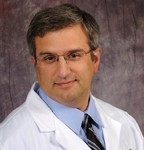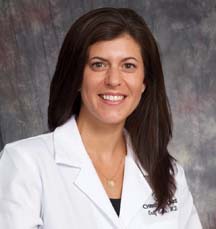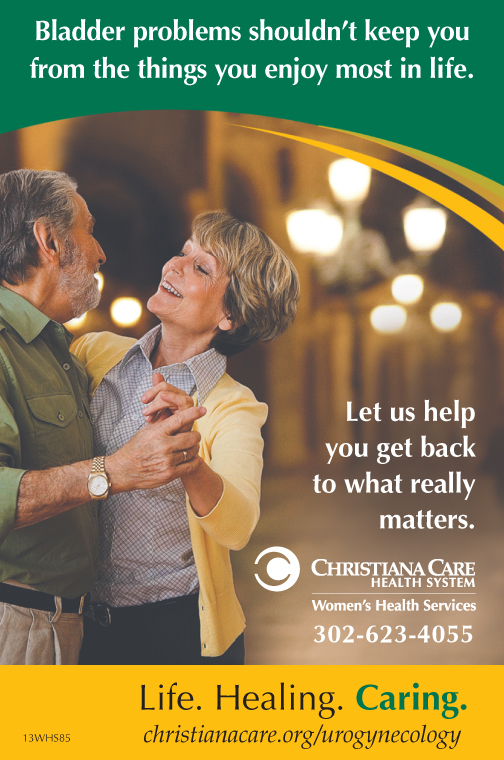Relief For Overactive Bladder
Without Medications Or Surgery!
Tibial nerve stimulation helps women to reclaim active lives
About half of all women experience stress incontinence — losing urine when they cough, laugh, sneeze or exercise — at some point in life. It’s a common problem in women of all ages, starting in their 20s. Many women tell us stress incontinence limits their ability to work out or enjoy an active social life.
Many women suffer from overactive bladder, or OAB, in which they need to urinate frequently or have a sudden, urgent need to go to the bathroom.
In fact, about 40 percent of women in the United States have OAB, making more than eight trips to the bathroom during their waking hours and often getting up at night.
There are several methods to treat the problem, including medications and behavior changes that can help. One effective option is a non-surgical treatment called tibial nerve stimulation. This option often works when medications and other treatments have not provided relief.
How does tibial nerve stimulation work?
Essentially, it’s an acupuncture needle inserted into the skin to stimulate the anterior tibial nerve on the outside part of the ankle. Most people say it hurts less than a bug bite.
Typically, patients get weekly treatments for 30 minutes for 12 weeks. Some patients might require treatment twice a week—the schedule can vary based on how each individual responds.
Improvement in five weeks
Most women see improvement by the fifth week, as their OAB symptoms decline. For people who have been struggling with the discomfort and challenges of OAB, the change marks a big improvement in quality of life.
Benefits of the treatment include using the bathroom less frequently especially in the middle of the night, getting a better night’s sleep and feeling more rested. In terms of urgency, patients say they have more time to get to the bathroom, which reduces their anxiety about leaking urine.
Further, people who respond well to tibial nerve stimulation can be gradually weaned off of medications they are taking for OAB – saving the money and avoiding the costs and side effects of medication.
Safe and effective
Although many people aren’t familiar with it, tibial nerve stimulation is not an experimental treatment. We’ve been doing the procedure for six years, and it’s been around for more than 10 years, starting in Europe – and the success rate to cure or improve OAB is about 75 percent.
Even though it is effective, tibial nerve stimulation is not permanent. The positive impact lasts nine months to 18 months. Happily, the neurological system has a good memory, so the response is much quicker the second time around, likely in four weeks.
Medicare and most private insurance companies cover the cost. Many insurance companies require that patients try other treatment areas such as medication before tibial nerve stimulation.
Our practice offers the procedure at our Christiana Hospital, Medical Arts Pavilion office and at Concord Health Center.
Tibial nerve stimulation is providing welcome relief for many patients with OAB. A tiny needle once a week makes a huge impact on their daily lives.
To learn more or make an appointment,call 800-693-CARE (2273).
Please mention you read about this treatment in The Women’s Journal.
Christiana Hospital Medical Arts Pavilion 2 302-623-4055
4735 Ogletown-Stanton Road, Suite 1208, Newark, DE 19713
Christiana Care Center of Women’s Health 302-623-4055
3706 Kennett Pike, Greenville, DE 19807
Christiana Care Concord Health Center 610-361-1030
161 Wilmington-West Chester Pike, Chadds Ford, PA 19317
www.christianacare.org/urogynecology
call 302-623-4055 or visit www.christianacare.org/urogynecology
You will meet highly skilled and caring physicians who are the only urogynecologists in Delaware who have completed fellowships and are board-certified in female pelvic medicine and reconstructive surgery:
 Babak Vakili, M.D., is the director of the Christiana Care Center for Urogynecology and Pelvic Surgery. Dr. Vakili completed his fellowship in female pelvic medicine and reconstructive surgery at the Louisiana State University Health Science Center.
Babak Vakili, M.D., is the director of the Christiana Care Center for Urogynecology and Pelvic Surgery. Dr. Vakili completed his fellowship in female pelvic medicine and reconstructive surgery at the Louisiana State University Health Science Center.

Emily K. Saks, M.D., MSCE, is a urogynecologist with the Christiana Care Center for Urogynecology and Pelvic Surgery. Dr. Saks completed her fellowship in female pelvic medicine and reconstructive surgery at the Hospital of the University of Pennsylvania.

Howard B. Goldstein, D.O., MPH, is a urogynecologist with the Christiana Care Center for Urogynecology and Pelvic Surgery. Dr. Goldstein completed his fellowship in female pelvic medicine and reconstructive surgery at Cooper University Hospital in Camden, New Jersey.
Matthew Fagan, M.D., MS, is a urogynecologist with the Christiana Care Center for Urogynecology and Pelvic Surgery. Dr. Fagan completed his fellowship in female pelvic medicine and reconstructive surgery at Greater Baltimore Medical Center/University of Maryland.



